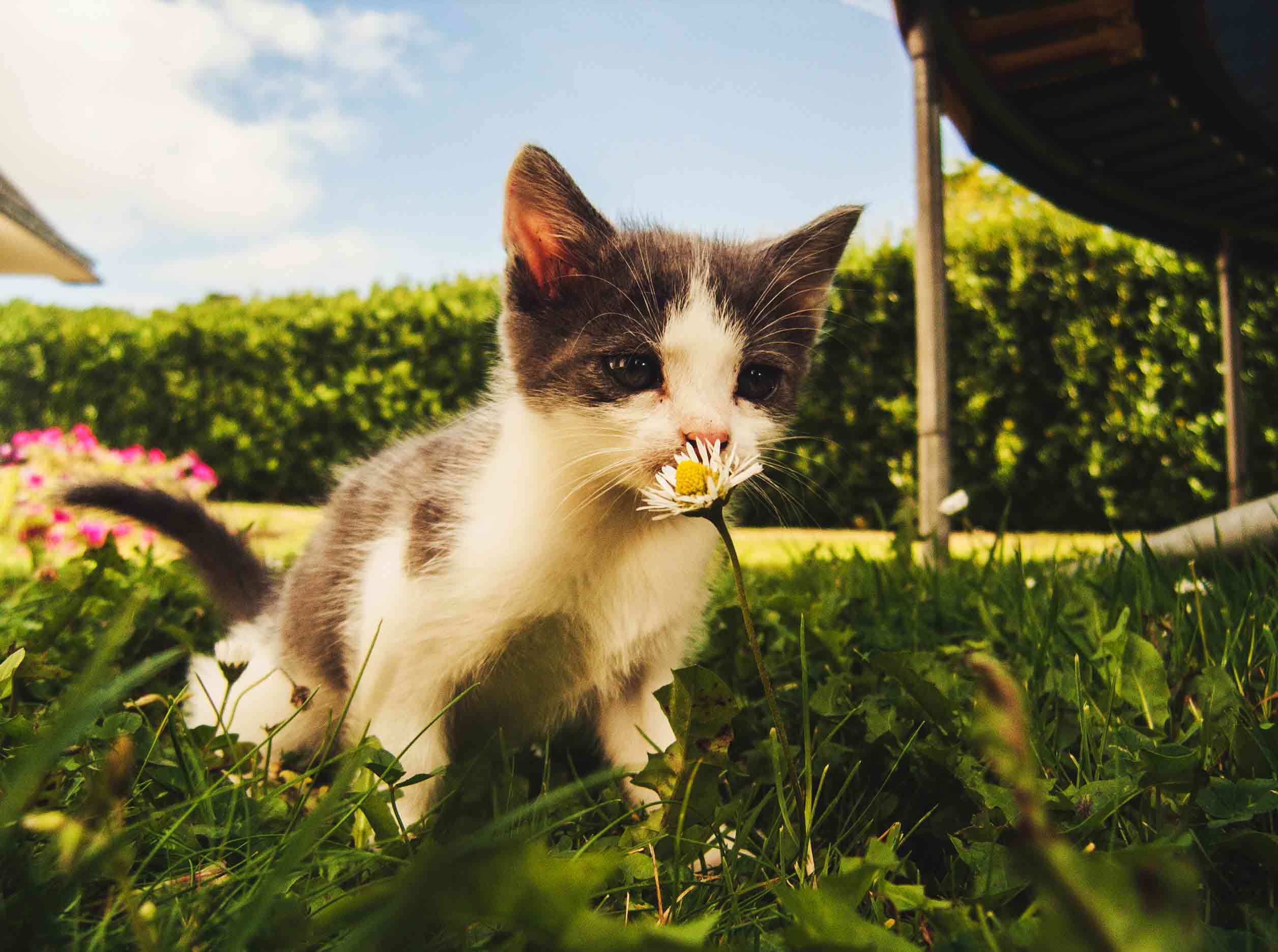
What is a smell that cats hate, and why is it wrong for them?
It smells that cats hate and why they are bad for them:
Cats have sensitive noses, so they have a great sense of smell. They can detect odors from a mile away. The smells that cats hate are not just random unpleasant smells but also those that convey danger. Cat’s sense of smell is so strong that they can even detect things like gas leaks or smoke alarms. Some smells can be pleasant for humans but intolerable for cats (e.g., citrus peel, rosemary).
Cats are wonderful pets with many unique personality traits, but they’re not perfect—and neither are we humans. Even though cats don’t necessarily like everything we do, the good news is that they’re very tolerant of us and most of our quirks.
However, there are things that cats hate—it doesn’t mean you should do them, but be aware if you do! If you want to be sure your cat hates you less, here are six scents that cats hate (with some helpful advice on how to stop doing them).

#1. Mint
It’s not just humans who can’t stand fresh mint. Because their sense of smell is highly tuned, cats do not like anything minty. It makes them feel sick and confused, which is why it is often used to keep them away from places where they aren’t welcome. If you have a houseplant or accidentally purchased a scented cleaning product that smells of mint, your cat won’t want to be around it.
To get rid of it as quickly as possible, he may try rubbing himself on everything in sight. So if you see him rubbing his head against your leg or furniture, tell him thanks but no thanks for trying to cover up that awful smell!
#2. Garlic
The smell of garlic is not exactly attractive to most humans, either. Garlic is an excellent tool for warding predatory animals, including dogs and cats. If you’re trying to keep a cat away from an area (like your garden or fruit trees), try putting some garlic cloves near plants that your cat has chewed on.
Just be careful not to use too much—the strong scent can linger for months in the soil, despite being watered down. Be sure to thoroughly wash any part of your garden or lawn where you’ve sprinkled garlic.

#3. Citrus
Citrus smells are a powerful nemesis to cats, and some even say they can give your cat an asthma attack. Lemons, oranges, limes, and grapefruits all fall into these categories – though you should avoid citrus if your kitty has sensitive skin.
But any citrus smell is going to be off-putting to cats; if you’re looking for a cheap air freshener that will keep your house smelling nice without annoying your feline friend, try putting a fresh slice of lemon in a small bowl of water near where they like to hang out.
#4. Spice
Cats are not keen on spices, either. But what does that mean, exactly? Not all spices are bad for your cat. What it means is that if you have a spice cabinet, put some things aside before you get a cat (or keep them in an area that your feline friend can’t access).
And when you do eat or use these items yourself, make sure they’re kept up and away from your cat. Even something as innocent as an everyday cinnamon danish could prove to be dangerous for your kitty if it gets into her mouth; dogs need to watch out for cayenne pepper and nutmeg, too.
#5. Clean laundry scent
The reason why cats hate clean laundry is that because it has a scent of humans, which cats tend to avoid. You should not use any laundry detergent made for humans, but instead a cat-specific one.
Many people claim that they have never had problems with their pets when using these detergents and recommend them as some of their favorites. Remember to use less than you would when washing your clothes because felines are small creatures with sensitive skin and require gentler treatment.

#6. Catnip
The scent of catnip, derived from a plant found in many nurseries, is often linked to playing behaviors. Many cats love catnip and will run around, jump, pounce and wrestle in response to it. Though a few kitties don’t respond, most felines have a favorable reaction.
This may sound like good news for those of you who share your home with feline friends; however, too much exposure to catnip can cause an adverse reaction or habituation – meaning your kitty will become less and less interested as time goes on. Even worse? It can lead to depression if they develop a dependence on it.
#7. Aromatherapy oil
Though cats can be sensitive to many things, they do not like aromatherapy oil. They hate smells. This is because cats rely on their sense of smell much more than we do.
One whiff of an aroma might seem relatively harmless to us, but for a cat, it could represent a threat or danger that they don’t understand and is afraid of. Aromatherapy oils may contain aromatic oils that give off strong scents that hurt your cat’s sensitive nose.
#8. Cucumber
The scent of cucumber is subtle, and cats usually don’t detect it. However, dogs have a good sense of smell, so you should be careful if your dog and cat are having playtime together.
Cucumbers are harmless to animals and can be used as toys to stimulate their interest. Just cut them into several large chunks and watch your pet go crazy for it!
#9. Honeysuckle
Sweet smells appeal to humans, but they’re also effective at deterring predators. Honeysuckle’s sweet smell is one reason why it’s used as a natural insect repellent and on skincare products for humans. It’s also one of many reasons why cats hate it.
You can plant honeysuckle around your garden or in potted plants around your home to keep unwanted pests away and give the kitty a tummy ache. You can even plant honeysuckle or another flower that smells like it near places where kitty does his business — he’ll be less likely to go back there if that awful smell lingers.
#10. Vicks VapoRub
An excellent smelling item on our list of smells that cats hate! Well, maybe not to us humans.
The same ingredients that make it a go-to treatment for coughs in children also happen to be one of your cat’s least favorite scents. Why is that? Because Vicks has a powerful smell to it, much like mint and eucalyptus.
#11. Cinnamon
Cinnamon indeed is one of man’s favorite scents. It reminds us of home and hearth, apple pie, and cocoa. But for cats, it’s a terrible smell, something that should be avoided at all costs. Not only does it make them sneeze, but it also scares them into thinking a predator is near—and runs away.
This scent means danger to your feline friend so steer clear from it if you want to win over your kitty cat!
#12. Lemon
Citrus scents can be pretty overwhelming for cats, so steer clear of air fresheners, candles, and other household items that include lemon.
Be sure to put away any citrus-scented cleaners as well. As a general rule, don’t use anything with a scent in your home if you have a cat; these scents can upset your feline friend’s stomach.
#13. Rosemary
The herb rosemary, which gives off a minty scent and has been used for centuries to treat migraines and other disorders, is an effective cat repellent.
Experts suggest scattering dried rosemary sprigs around your house or rubbing fresh rosemary on your furniture if you want to keep cats away from that one particular room. You can also make a spray by adding two tablespoons of rosemary oil to one cup of water. Spray these surfaces with a small amount of liquid several times a day until cats stay away.

#14. Neem Oil
The scientific name for neem oil is Azadirachta indica. It is a hardy tree that can grow up to 30 feet in height and 15 feet in width. The oil extracted from its seeds has been used since ancient times to help control parasites, pests, and fungi that feed on plant tissue. Because of its ability to stop pests at their source, neem oil makes an effective means of protecting garden plants from destruction by bugs.
Could you keep reading to learn how cats hate it? You don’t have to live with an infestation of ants or unwanted guests outside your home when you can get rid of them with something as simple as neem oil!
#15. Lavender
Lavender is perhaps best known for its ability to calm people down. However, it’s also been used as a way to deter cats from entering an area. A lavender sachet or spray can help keep your cat away from rooms you don’t want him in, such as laundry rooms and guest bedrooms. Keeping lavender plants around your home can also keep him out of problem areas in general.


My cat chews on the corners of wood furniture. Sadly, they are antiques. How can I stop this?
t’s quite common for cats to chew on wood furniture, particularly when they are teething or bored. Here are a few things you can try to discourage your cat from chewing on the furniture:
Provide appropriate chew toys: Make sure your cat has plenty of appropriate chew toys to play with. This will help redirect their chewing behavior away from your furniture. You can also try sprinkling catnip on the toys to make them more enticing.
Apply a deterrent: There are several commercial sprays available that are designed to deter cats from chewing on furniture. These sprays typically have a bitter taste or unpleasant smell that will discourage your cat from chewing. You can also make your own deterrent spray by mixing water and apple cider vinegar in equal parts and spraying it on the furniture.
Cover the furniture: If your cat is only chewing on specific areas of the furniture, you can try covering those areas with aluminum foil or double-sided tape. Cats generally don’t like the feel of these materials on their paws and will avoid them.
Provide scratching posts: Cats need to scratch to maintain their claws, so providing scratching posts around the house will give your cat an appropriate place to scratch and may help reduce their urge to chew on furniture.
Supervise your cat: If your cat is particularly persistent in chewing on the furniture, it’s important to supervise them when they are in the room with the furniture. This will allow you to redirect their behavior as soon as you see them chewing.
Remember, it’s important to be patient and consistent when trying to change your cat’s behavior. With time and effort, you should be able to discourage your cat from chewing on your furniture.